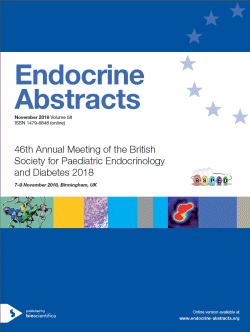
46th Meeting of the British Society for Paediatric Endocrinology and Diabetes
Birmingham,
UK
07 Nov 2018 - 09 Nov 2018

Poster Presentations
Thyroid
ea0058p038 | Thyroid | BSPED2018
Long-term outcomes of thyroid function in babies with Down syndrome and congenital or early hypothyroidism
Bendor-Samuel Owen , Basu Supriyo , Robertson Clare , Makaya Taffy
ea0058p039 | Thyroid | BSPED2018
Isolated central congenital hypothyroidism (CCH) due to (Immunoglobulin SuperFamily member 1) IGSF-1 gene deficiency
Sharma Anu , Narayan Kruthika , Scurr Ingrid , Warner Justin , Burren Christine P
ea0058p040 | Thyroid | BSPED2018
MEN2B and MTC: the challenge of early diagnosis
Gomes Sonia , Izatt Louise , Hulse Tony
ea0058p041 | Thyroid | BSPED2018
Single UK tertiary centre experience of newly presenting thyrotoxicosis in childhood and adolescence (2013–2018)
Munshid Sarrah El , Arya Ved B , Kalitsi Jennifer , Kapoor Ritika R , Buchanan Charles R
ea0058p042 | Thyroid | BSPED2018
Impact of iodine deficiency on thyroid function in vegan siblings
Brandt Agnieszka , Ajzensztejn Michal , Sakka Sophia , Cheung Moira , Hulse Tony
ea0058p043 | Thyroid | BSPED2018
Audit of management of neonates born to mothers with thyroid disorders
Tamhankar Priti , Upadrasta Swathi



